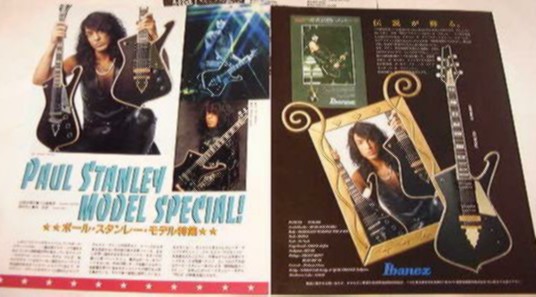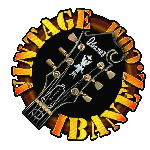 |
PaulStanleymodels
|
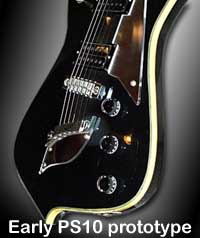 Probably the most sought after by collectors is the PS-10,
or Paul Stanley model. This came out in 1977 as the popularity of the
rock band KISS
skyrocketed. Ibanez approached Paul while KISS was on tour in Japan in 1976. They offered him a chance to develop his own signature model. He liked the shape of the Artist 2663 model and made changes to that model as his ideas came to fruition in the PS10 model. The PS10 first appeared in the 1978 Ibanez catalog, although it may have been available for purchase prior to catalog printing.
Probably the most sought after by collectors is the PS-10,
or Paul Stanley model. This came out in 1977 as the popularity of the
rock band KISS
skyrocketed. Ibanez approached Paul while KISS was on tour in Japan in 1976. They offered him a chance to develop his own signature model. He liked the shape of the Artist 2663 model and made changes to that model as his ideas came to fruition in the PS10 model. The PS10 first appeared in the 1978 Ibanez catalog, although it may have been available for purchase prior to catalog printing.
Paul Stanley (rhythm guitar, vocals) played an Iceman for
the next 4 years. Look inside the album cover of KISS ALIVE II for a live
shot of him with the Iceman. This model retailed for about $695 in 1978, and was offered through 1981. In 1995 the PS-10 was re-issued as the PS10-II and in 1996 an additional PS model was unveiled - the PS10-LTD (or Limited). Sales must have been good because in 1997 yet another PS was offered in the catalog - this was sold as the PS10-CL (or Classic). The biggest difference between them is that the PS10-II was made in Korean factories and the LTD and Classic were Japanese made and also had all the same features of the original 1978 model (like the Gibraltar bridge and Quick Change tailpiece). Although the catalog shows the PS10-II with "Paul Stanley" inlaid at the 21 fret, most were not produced this way. Apparently there was a problem with the inserts at the Korean factory and it was decided not to use them.
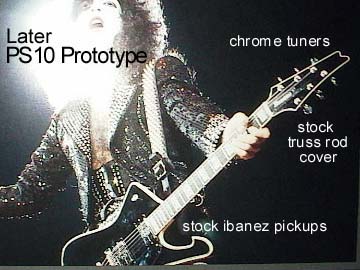 At one time, in 1997, you could buy a PS-10 directly from Paul Stanley! He was selling the LTD for $2000 and the Classic for $1800 (each with signed certificate), but that was discontinued in 1998. I've been told that he and a partner bought the remaining inventory of Paul Stanley models from Ibanez and what he is going to do with them remains a mystery. The
ad for them is here. Paul Stanley strayed from the Ibanez in 1999 and hooked up with Washburn Guitars to introduce a new PS model that is cool looking in it's own way. Check the washburn.com site to see that one.
At one time, in 1997, you could buy a PS-10 directly from Paul Stanley! He was selling the LTD for $2000 and the Classic for $1800 (each with signed certificate), but that was discontinued in 1998. I've been told that he and a partner bought the remaining inventory of Paul Stanley models from Ibanez and what he is going to do with them remains a mystery. The
ad for them is here. Paul Stanley strayed from the Ibanez in 1999 and hooked up with Washburn Guitars to introduce a new PS model that is cool looking in it's own way. Check the washburn.com site to see that one.
The "Cracked Mirror" Iceman
Paul Stanley also had a custom Iceman built by Ibanez around 1979 and was using it again for some songs on the 1996-1997 KISS "Reunion Tour". This was an Iceman
that was retro-fit with a cracked-mirror top, or the "Mirror Ball" Iceman, as Jeff Hasselberger calls it. Jeff should know, he is the guy that built the guitar for Paul. Read his account of building
this incredible instrument.
The 1992-1993 KISS 20th Anniversary
Model
This ultra rare beauty was a very limited run in 1992 - 1993. Contact
Robert A. Calise, if you are
interested in this particular guitar, it's for sale.

"I have heard an extreme amount of confusion and differing
opinion regarding this guitar. There seems to be almost more confusion about this model than any other Iceman. This model was released in 1992-1993 celebrating Kiss's 1973-1993 20th anniversary and they where the 1st reissuse since the original 1976-1982 models. They were produced as the "IC1000BK".
The guitar has "20th Anniversary" inlaid in the 22nd fret and has "PS10 Limited Reissue" on truss rod cover. I spoke with Jim McCloskey at Ibanez about this very guitar about two years ago. He told me that the guitar was produced in both 1992 and 1993 and it was actually called the IC1000BK.
These models appraise at 1500-2500 dollars or so. Approximately 511 were produced worldwide, 200 units sold in the United States."
That information was received from Iceman fan Chad
Tevebaugh, who spoke directly with Jim McCloskey at Ibanez in 1997
about the KISS Anniversary model. I bet this won't be the end of the arguing about the numbers, but I think Chad has some good info here and I wanted to share it with all the Iceman lovers out there.
Beyond the Iceman - Paul Stanley kisses Ibanez
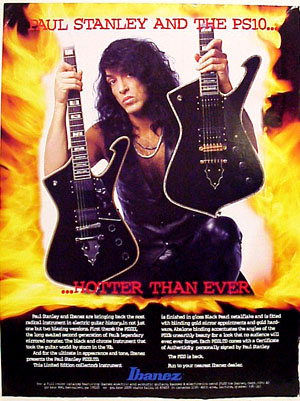 Paul Stanley - The Prince Of Pout and KISS' profilic songwriter
- has strutted across the world's concert stages with some
pretty amazing custom-made guitars during the last 20 years,
with good reason. Its futuristic Iceman shape and Les Paul-like
tone are legendary. Stanley recently took a break from KISS' grueling
tour rehersals to discuss the guitar that put Ibanez on the map. This interview was published in Guitar Shop, October 1996
Describe your first encounter with the Ibanez Iceman and how the PS-10 model came about.
Paul Stanley - The Prince Of Pout and KISS' profilic songwriter
- has strutted across the world's concert stages with some
pretty amazing custom-made guitars during the last 20 years,
with good reason. Its futuristic Iceman shape and Les Paul-like
tone are legendary. Stanley recently took a break from KISS' grueling
tour rehersals to discuss the guitar that put Ibanez on the map. This interview was published in Guitar Shop, October 1996
Describe your first encounter with the Ibanez Iceman and how the PS-10 model came about.
First of all, the Iceman and the PS10 have about as much in common as a Chevy and a Rolls Royce.
The PS10 came about in the '70s, when were on out first trip to Japan. Ibanez was interested in me doing
a signature guitar with them. They wanted to me to design something new, and we did go through
their catalog, I saw a picture of a guitar that was not terribly popular. I liked the
asymmetrical shape to it; it reminded me of a firebird or a Rickenbacker bass turned upside down.
It had one pickup on it that looked like you took three bobbins from a humbucker and put them
together somehow. It also had that wacky knob that looked like you were to change your television
channels with it! I said, "You've got something here, but you don't know what to do with it."
My feeling about Ibanez in the '70s, like many companies in Japan,
was that they were excellent at copying but they didn't know why
they were copying.
So we sat down and, by using that basic shape, I came up with a guitar:
construction, frets, inlays, wiring, the type of tail block that has a
sustain block built into it, the half-brass/half-bone nut, and so on.
In other words, we took a shape a made a new guitar. Although there is still a guitar called
an Iceman and some people use the name interchangeably with the PS10,
they really have nothing in common expcept a silhouette.
Soundwise, was there a guitar you were trying to emulate?
The classic guitar to me, that I wanted to echo in some way, was a Les Paul Standard.
You have a mahogany body that gives you great warmth and you have the maple that gives
you the brightness and the sustain.
Was the PS10 more a stage guitar than a studio workhorse?
I used it quite bit in the studio. I started using it in '77 and used it freely
from then on. My guitar has proven itself over the last 20 years to be not only
credible, but a real cornerstone in what I do. I may have used other guitars at
different times, but I always found my way back to those guitars.
What's the story behind your shattered-mirror PS10 that you started using
onstage during the Dynasty tour?
When the band was first starting out, I saw Slade, and their singer, Noddy [holder], had
a top hat with mirrors around it. They would hit it with a spotlight and these beams of light
would come out of his head. It was really cool and the mirror-ball effect we were using in
shows was also cool, so why not fracture a mirror on the face of the guitar, but make sure
that each facet is offset from the neck so that when the light hits it you literally have
hundreds of lights shining out of the guitar.
When you called up Ibanez with this idea, did they think you were out of your mind?
That was a well-known fact from day one! That was nothing new. They were very good-natured
about it, and it was much easier than bringing somebody with you tugging and screaming.
If the glass was set into the body, did that mean the maple top was 86'd?
The maple was still there.
Wouldn't the glass screw up the tone of the top wood?
The glass didn't radically affect the tone, maybe because it was set in an epoxy.
Glass certainly is dense enough that it propably picks up some of the vibrations.
Surprisingly, it sounds very much like my other ones. Go figure.
By Greg Pedersen
